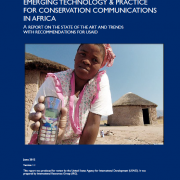Mobile Khabar to Bring News & Empower via Mobile
On August 11, Afghans will be able to receive free access to radio news broadcasts, cricket scores, and other informational audio content through their mobile phones.
The USAID project—named Mobile Khabar, roughly translated to “News” in Dari and Pashtu”—is made to improve Afghans’ access to information and empower local journalists.
With 28 percent illiteracy, and an estimated 60 percent of Afghans using mobiles, cellular phones are a widely used technology more accessible than radio and have a much wider reach.
Troy Etulain, the project’s architect and a senior advisor for media development in USAID’s Office of Democracy and Governance, says that when the system is up and running in a month, users will be subscribe to local radio reports by dialing a four-digit code on their cellphones.
The information will include everything from national cricket scores to English lessons offered through the Afghan foreign ministry. Additionally, audio bloggers will contribute to commentaries through a system similar to voicemail.
The system uses interactive voice response, or IVR and provides free, customizable menus of news and public information via mobile, making a variety of topics for the caller to choose from.
For example, a user could listen to a requested cricket update then hear a story about HIV/AIDS in her hometown, followed by the option to leave a message. The system can also be programmed to tell the user the number of AIDS patients nearby, letting her know that she’s not alone and creating a virtual community similar to other social media sites.
“If the technology connects, empowers or protects them or helps make other people who are not part of the community aware of them and their potential, then it’s doing profoundly new things,” Etulain declares.
USAID funding for the project runs on a $7 million grant that may increase to $16 million if option years on the main contract are fulfilled.
Mobile Khabar is just one part of USAID’s media development program in Afghanistan—the largest the agency has ever funded using new technologies, and regional journalism training centers, to seek and fill information not covered in newsrooms.
Within the centers, professional Afghan journalists and citizen bloggers are being trained in everything from Internet media skills and business management, to the reporting basics, such as ethical objectivity and story selection, Etulain says.
One of the common ways USAID utilizes these journalistic skills on the ground, is supporting community radio stations with the goal of making their operations solvent and the programming relevant to their audience, which encourages civil society participation.
For example, a call-in show that allows citizens to question their elected officials or covers topics that might not otherwise get airplay, like domestic violence or school dropout rates.
Mobile Khabar is a platform that allows local radio stations to become available on mobile phones, an innovative approach that extends the reach of information while encouraging sustainable economic development.
“From a media development perspective, this says to a local radio station in Mazari Sharif: ‘OK, now you have a national audience,” Etulain explains, “Wherever people have access to mobile phones, they can listen to you. And you get paid more the more people that listen to you.”
USAID funding for the project’s programs and bloggers are distributed based on their popularity: the more listeners they attract, the more money those programs and bloggers will earn, he says.
The Mobile Khabar project is a complement between old journalism and new technologies, providing an accessible avenue to inform Afghan civil society on relevant content. All while empowering local journalists to speak up and contribute information on what they see to their people.







































